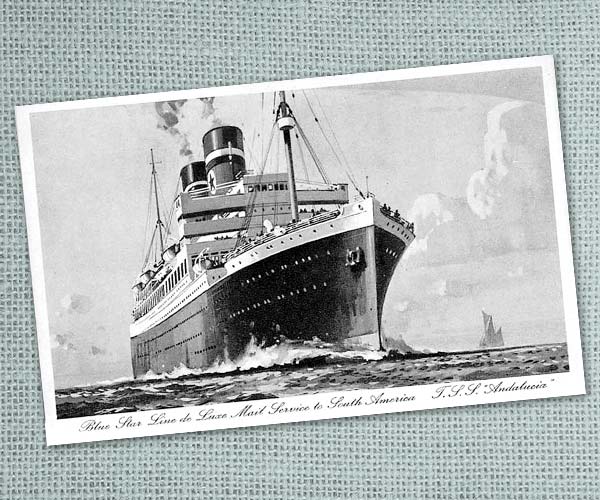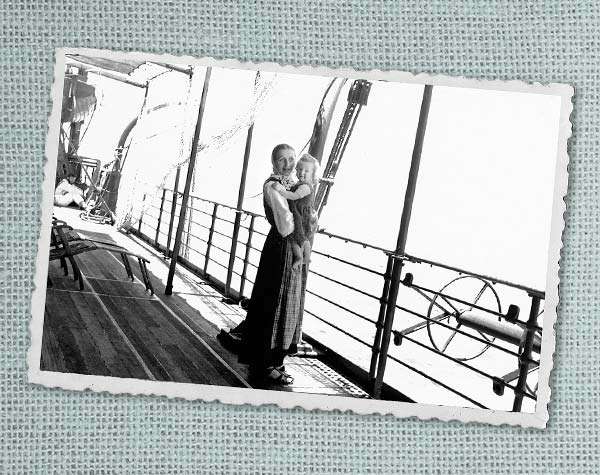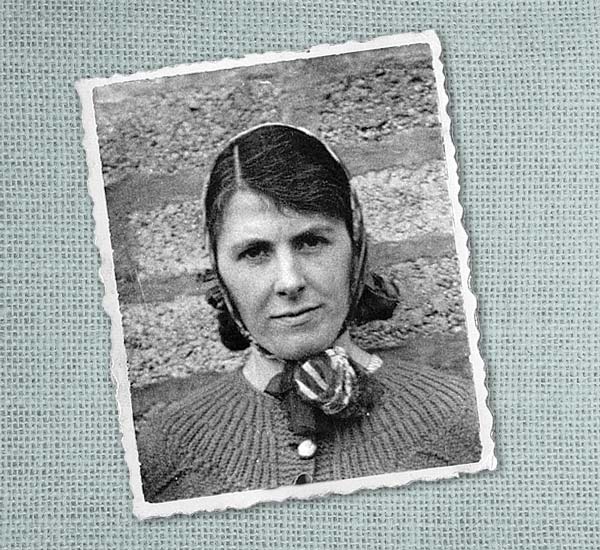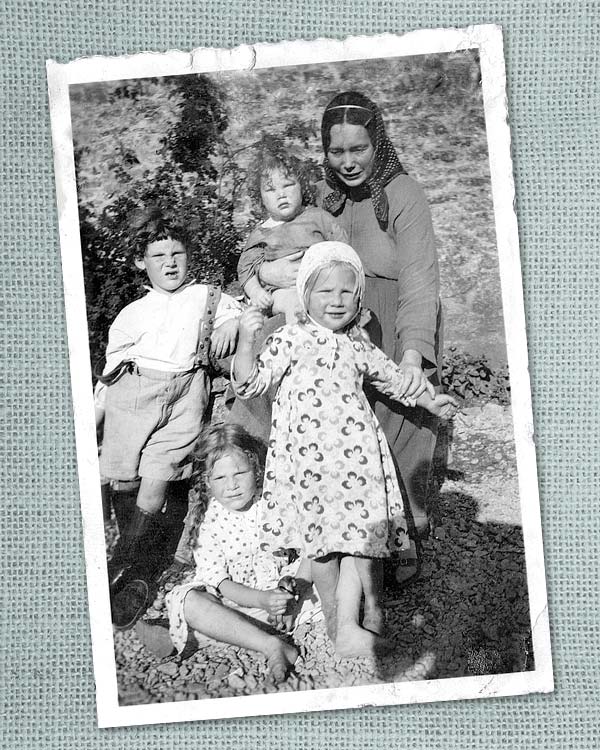Subtotal: $
Checkout-

Life in Zion
-

How to Run a Cemetery
-

Integrity and the Future of the Church
-

Daring to Follow the Call
-

Poem: “For the Celts”
-

Poem: “Wreathmaking”
-

Poem: “The Hunger Winter, 1944–5”
-

Editors’ Picks: The Cult of Smart
-

Editors’ Picks: The Utopians
-

Editors’ Picks: The Lincoln Highway
-

Casa de Paz
-

The Pilsdon Community
-

Letters from Readers
-

Nonexistence Does Not Scare Me
-

Toyohiko Kagawa
-

Covering the Cover: Beyond Borders
-

Choosing America
-

Church as Sanctuary and Shelter
-

Northern Ireland’s New Troubles
-

When Migrants Come Knocking
-

The Florentine Option
-

Three Kants and a Thousand Skulls
-

The End of Rage
-

Telling a Tale of Two Fathers (Video)
-

Home Is Not Just a Place
-

The Quest for Home
-

In Search of Lost Fig Trees
-

Child of the Stars

Refugee Letters
At the height of World War II, three women flee Europe with the Bruderhof community for a pioneer life in South America.
By Emmy Barth Maendel
May 16, 2024
Next Article:
Explore Other Articles:
From No Lasting Home: A Year in the Paraguayan Wilderness.
Trautel groaned and stumbled dizzily back to her bed, fighting nausea as the ship rolled under her feet. In his nearby basket, her baby stirred. Felix was only five weeks old and had cried most of the night. He was quiet now, but she herself could not sleep. What lay ahead for her little one? “God, why are you leading us into the danger-ridden tropics? What sacrifices will be demanded of us?” She remembered the fear that had clutched her heart in Liverpool as she crossed the gangplank onto the ship, little Felix held tight in her arms. She felt that the fates of all of them were on a razor’s edge, suspended between life and death, heaven and earth. “Will I ever touch solid ground again? Will the demon of war let this big ship pass unscathed?” She pulled herself together. “Do not question, my soul, but trust. God is leading us out of a war-torn country. He will protect us and our children on the ocean and also in the strange land we are traveling to.”
It was the end of November 1940. They were on a luxury liner, the Andalucia Star, one of the few passenger ships to dare the submarine-infested ocean. It had no second-class berths, so the eighty refugees she was crossing with traveled first-class.

Operated by England’s Blue Star Line, the Andalucia Star, which carried Bruderhof refugees across the Atlantic in 1940, was torpedoed off West Africa two years later. All Images courtesy of the Bruderhof Archive
Leo and Trautel Dreher had left Switzerland eleven years earlier to join the Bruderhof, a Christian community then located in Germany. Little could they have known what taking this step would mean: that they would soon have to flee Nazi Germany for England, and then England, too, for the sake of their pacifist convictions. Now, with six small children, they were on their way to Paraguay, that mysterious, landlocked little country in the middle of South America.
Marianne Zimmermann was on the ship, too, with her husband, Kurt, and their four children. She kept a journal for them to read when they grew up:
With this voyage, a new period of our community’s history begins. We’ve taken leave of a beautiful home and are now preparing for a new life. I would like to write something for you, my beloved children, about this trip, which will have great significance. The goal, the castle and the city in which Jesus lives, is and remains the same, even if there are many unknown paths before us. We must look unwaveringly to Jesus; Peter was able to walk safely on the water as long as he looked to Jesus.

The Atlantic crossing on the Andalucia Star, 1940
Phyllis Rabbitts, a thirty-four-year-old English nurse and midwife who had come to the community only a few months earlier, wrote a letter to her family describing the departure:
The idea of a whole community being transferred from one country to another in wartime was something one could not grasp. It seemed too great a miracle. We had realized for many months the insecurity of our position in England as there was so much hate growing in the hearts of the general populace. This could be understood because we had many German members; also the pacifism of our English members roused a bitter spirit in nationalistic minds.
Although national and local government officials were tolerant and understanding, our economic position was getting acute because of the local hostility, which crippled our business. Also the curfew affecting our “alien” members curtailed considerably our sending out brothers for mission. The church was in peril and had to be saved, and there was a definite leading from God that we should leave the country.
Following this leading from God was not easy. We had a well built-up Bruderhof – the dwelling houses were still quite new, and the dining/meeting room was brand new and beautiful in its simplicity. The laundry with its modern machines had also not long been set in motion and was a tremendous boon to those who had known what it was to wash everything by hand in difficult conditions. The new baths and toilets were also a very welcome achievement. In fact, all over the whole Bruderhof one could see the fruits of four to five years’ struggle and hard labor.
But now the time had come to lay down our tools and leave all this and to pick them up again in another country that we could not choose for ourselves.
Having so many young children and several elderly and infirm members, all this was far from easy, for no one could foresee this kind of journey in wartime. Twenty-two babies were born in the year 1940 (one was stillborn) and twenty in the previous year, so there were many very young children taken to Paraguay.
After a long seeking and waiting to know the will of God concerning us, the first group left the Cotswold Bruderhof to build up afresh in a hitherto unknown (to us) land – the Chaco region of Paraguay! … Between there and England lay the dangerous ocean, where ships were being either sunk or bombed almost daily. …
For what purpose were we being led out of England to Paraguay? Many such questions filled our thoughts. But deep down in our hearts was a strong feeling that … together we would continue the fight and struggle so that God’s will might be done through us, wherever that might be.

Phyllis Rabbitts, 1940
The Andalucia Star steamed down the South American coast, stopping now and then at various ports, until it entered the Río de la Plata.
A Brazilian doctor boarded and examined everyone. Three days later – four days before Christmas 1940 – they left the luxurious ocean liner that had been their home for four weeks. They boarded a steamboat that was to take them up the Paraná River, deep into the South American interior.
From now on there were no more first-class comforts. They were traveling third class, all eighty-one of them, in one large room in the hold of the ship, with no windows. Each adult shared a bed with a child. The heat was intense, the stench terrible, and the cabin dirty; Cyril Davies, the community’s doctor, forbade drinking water without boiling it first. During the day they sat among the bags and trunks, trying to distract the children with songs and games. Marianne wrote:
Now we were really entering the unknown! In spite of the terrible heat, in spite of the cramped quarters and dirt and loudly screaming passengers, we felt more comfortable, more that we were “on the road,” on the path of the pioneers. For young people without children, the whole trip would have been an adventure. But to care for our little children was not easy, especially regarding hygiene. We bathed them in barrels that were filled with river water and in which we also washed our laundry. Many children got heat rash or other rashes.
It was Christmas Day when the steamer arrived in Asunción, the Paraguayan capital. Paraíso trees were in bloom along the streets. The heat was oppressive to the northern European newcomers. They changed boats again, getting into a small barge with only a canvas cover for shelter. First the luggage was transferred – all twenty-three tons. After that, there was no room left, and the people sat squashed between their bags. The children were crying; several had fevers. Again they were to sleep in the windowless hold, but this time they got several first-class cabins for the sick and the pregnant women. They ate bananas and pineapples, as other food was hard to procure.
They watched the riverbanks closely, trying to envision these unfamiliar surroundings as their new home – mile after mile of largely uncultivated land, shrubs, and palm trees. Dark herons and snowy egrets stood amid the marsh grasses; flocks of parrots and a few toucans flew overhead. One day the children crowded to the rail to see a crocodile. A hot wind blew in from the shore, laden with the scent of orange blossoms. Sometimes the boat docked at small port towns, and Paraguayans and Indigenous women could be seen, carrying large baskets of bananas or chipa, a local bread, on their heads.
After two days’ travel they arrived in Puerto Casado, the river port that marked the end of this part of their journey. Marianne found that all three of her young daughters had contracted lice on the riverboat. She withdrew with them into a corner and began combing out their hair. “At least we are here together, alive and healthy,” she comforted herself in her diary.

Boarding a steamboat for the inland journey
In the chaco, the arid region of western Paraguay, Marianne and her fellow immigrants found a temporary home in a colony of Mennonites, who housed them in their school. Marianne spent her days supervising the thirteen school-age children. Excursions through the thorny underbrush offered exciting discoveries – fossilized seashells in the sand, remnants of the prehistoric sea, brilliantly colored butterflies, and a bounty of birds. There were vultures and parrots, wild pigeons, and even a small woodpecker with a bright red head. The wild animals were shy, but not the snakes, which came uncomfortably close to the community’s shelters.
The narrow paths trodden by the Indigenous local people yielded new surprises too. Once the children came across a woman sitting on the ground in a little clearing, weaving. Holding the threads taut with her big toe, she skillfully wove them into bracelets, necklaces, and belts.
The community sent out search parties to look for land where they could settle. As one of their leaders, Hans Meier, later reported:
Some of us started out with a Lengua (Enlhet) chief to find a place. We deliberately turned not only to the company that owned the land, but also to the so-called Indians from whom the land had been stolen. They were very helpful because they understood our longing for community. After riding for several hours on small horses – instead of saddles, we rode on sheepskins – we arrived at a large tract of land which the chief indicated would be a good place for us to settle. As the formal purchase price for the property, which was comprised of several hundred hectares, he asked for only one dollar. Instead of a signed contract, he requested a handshake, which was of more value to him than a written statement.
Accompanying him to his home after this, we found a tree, the lowest branches of which were covered to keep the rain off. All the members of his community sat on the ground in a circle around this tree. Apparently it was here that they handed in the game from their hunting expeditions or whatever they earned to the oldest woman, who divided and distributed it according to need.
In the end, the property they bought was in the east part of Paraguay, in a sparsely populated area of mixed savannah and jungle with more rainfall that promised to be easier to farm. After three months in their makeshift quarters, the group piled their families onto wagons for another move. The new place was a ranch called Primavera – “spring.”

Kurt and Marianne Zimmermann with their children in Paraguay, 1941
As they bumped through the forest, the pioneers admired the palm trees and the wide view of green meadows edged by dark woods. Finally they saw the thatched roofs of Primavera – houses that an advance group had quickly constructed as their new home. Marianne wrote a few weeks later:
We have now been here for a good month, in Primavera, at Isla Margarita, the highest point, more or less in the middle of our property. Day by day it becomes more of a “Bruderhof.” There are many palms up here, signs of the peace of the city on the hill that is to arise here. May it truly become a fortress of Zion! God has led us into a beautiful land. In every respect this is a unique and wonderful time, where besides the joy and strain of building, the church will have to be newly founded inwardly. I have yearned for a long time that for once everything in the church might become new, like at the beginning, through a refreshing spirit, a Pentecost that will make us all new from the bottom up. God has led his weak, little flock together in such a wonderful way, one group after the other. But it becomes ever clearer to me that this will be given to us only insofar as we accept the way of Christ. We will have to suffer and will be allowed to suffer; we must surrender and will be allowed to surrender ourselves completely; we shall pass through death, believing and expecting that the kingdom of God is near.
They lived in the “Gallop Hut,” so named for the speed with which it had been erected. It consisted of a corrugated iron roof on palm trunk supports. Four “halls” were still being built. These had thatched roofs on wooden posts sunk one meter into the ground. Neither the Gallop Hut nor the halls had walls to separate families. People used their luggage and mosquito nets to give an illusion of privacy and dressed before it got light. Phyllis described their living conditions in a letter to her family in England:
Sometimes we get very heavy dews in the mornings, and anything that is not under cover is very wet. As we have no walls to our houses, it penetrates everywhere. We have no furniture yet so live in our trunks, so to speak, and that is not too easy. When they have been packed tightly to come, things don’t go back so easily. It is a real camp life for us all. We all sleep on bedsteads but no mattresses, and when there aren’t enough bedsteads, and there often haven’t been, people sleep on benches. We are all hardening and it is good. Civilization has become too soft, and comfort takes too high a place in one’s life to the detriment of one’s inner life. I am very glad to have experienced the poverty and need of these first weeks in Paraguay. I had taken too much for granted in the old life before I came to the Bruderhof. I always thought I would have sheets to sleep in and bread and butter to eat, or at least margarine, and a cup of tea to drink. I never thought that I could eat rice for breakfast, rice for dinner, and rice for supper (and not made with fresh milk, only water and some cheap dried milk). We have little cow’s milk, and that the children have. Bread is scarce, but we usually get a little once a day. Even so, I’m told we have better food than when the community was in Germany. I think that there they semi-starved. Actually our chief difficulty is the sicknesses and having no doctor. So many (in fact, nearly all) our people and children have septic wounds on their legs and elsewhere. We are up against a very horrible kind of wound, such as one wouldn’t meet in England. Nearly all the wounds have live worms or maggots in them and give much pain. Some of the children have these wounds in their heads and must have their heads shaved. My first experience with this nearly sapped all my courage and made me feel very sick, as I had to extract one from a tiny child’s eye. I am nursing sick babies and children all day long.
By June 1941, 329 men, women, and children had made it across the ocean. In addition, seven babies had been born since leaving England. Finally all were together in one location. Would they be able to realize their dream of making Primavera a “city on a hill”? They knew it would take hard physical work; perhaps they did not realize that the spiritual work would be even harder. Phyllis wrote in July:
One feels one cannot sit still and do nothing while there is so much sorrow and suffering around one; and until he or anyone sees the need and feels the call to give oneself to a new order he will find himself more and more caught up in the old one. I can only say I hope that this judgment on the earth will be shortened and that mankind will listen and harken to the message which it brings. … It is a shocking thing that war is needed to shake one out of oneself into seeing and feeling the need of the whole world; and for some of us it has needed this, but how infinitely more tragic is it if a war, and such a war, fails to do that for us. We must indeed search within ourselves to learn the secret of our deadness and long that light and life shall break in.
Over the fall and winter, housing conditions slowly improved, and the men began drawing up plans for a hospital that would serve both the community and their new Paraguayan neighbors.
The hospital wasn’t yet finished when, in October, Trautel’s eleven-month-old son, Felix, fell sick. One evening when she went to pick him up from the nursery, he was lying in his crib, crying piteously. She was alarmed. He had a loud cough, hard and barking. He seemed to have a fever, and his breathing was quick, with something of a rattle.

Trautel Dreher with her children at the Cotswold Bruderhof in England, 1937
It was a restless night. His breathing grew more and more rapid. His chest heaved, his eyes were dull; his arms stretched out listlessly on the blanket. His voice was hoarse when he cried, his lips parched. Through the long night Trautel sat at his side. The community gathered to pray for his life. But the next day, less than twenty-four hours after she noticed he was sick, he died.
Later Trautel wrote in her diary: “O my child, with what pain I bore you! Is it joy or pain that now fills my heart and bosom? I do not know. I only know that I give my child back to God who gave him to me.”
Two months later, when the community celebrated Christmas 1941, it was a bittersweet time. They gave thanks for their safe passage across the dangerous ocean and their first year in a new country. Yet their escape from war-wracked Europe had come at a heavy cost: in addition to Felix, four other children had been lost. As Marianne wrote:
With great thankfulness we left the old year behind and began the new. In the past months God gave so much to the church that our hearts have not really taken it in. One thing stands above all else: God’s love and grace and mercy are great and were with us – also in the dark hours of death.
Phyllis confided to her sister back in England: “We are only ordinary human beings and we couldn’t stand any of this if it were not for the strength given us to give up all for the sake of Christ and his kingdom of peace and justice. If we lose faith or lack vision, then the whole thing becomes impossible.”
All the same, Phyllis had learned to face the practical challenges of her new life with equanimity: “We are thankful to have a roof, and the bits of sacking when a storm comes in all its fury. And they come often. Often one has had one’s bed and things wet, and as for the sand, it gets into everything, and then comes the sun again and dries all up, and we wash and make clean again until the next sand comes.”
This article is adapted from No Lasting Home: A Year in the Paraguayan Wilderness (Plough).
Already a subscriber? Sign in
Try 3 months of unlimited access. Start your FREE TRIAL today. Cancel anytime.






































